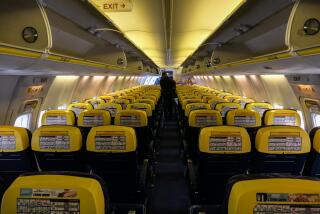Pilot Who Lost Use of Legs in Air Crash Refuses to Be Grounded : Aviation: Rick Richmond of North Hills competes in a 300-mile cross-country airplane race.
- Share via
When his plane crashed during a search and rescue training mission seven years ago, rendering his legs useless, Rick Richmond wondered if he would ever walk again. But he never considered for a moment that he would give up flying.
Now, Richmond, 45, of North Hills is competing in a 300-mile cross-country airplane race--the only pilot with a disability to enter.
In a specially designed single-engine Piper equipped with a rudder bar to steer, Richmond embodies the love of flying shared by the competitors in the 34-plane race, a time and distance event that began and ended Saturday in Salinas.
Richmond placed first in his division.
“There was no doubt I would get back in an airplane,” said Richmond, who flew to the race Friday from Van Nuys Airport. “The crash didn’t frighten me. I’m probably more afraid of driving in L.A. than flying in L.A.”
Although he says this with a smile, the crash that left him a paraplegic was nothing to laugh about.
One moment, Richmond was piloting his Civil Air Patrol aircraft near Bishop on June 8, 1986, carrying his father and another passenger, David Widrig. The next, Richmond recalled, a sudden downdraft forced the Bonanza 35 plane into a canyon, where it crashed and exploded.
Both Richmond and Widrig suffered broken backs but were able to get out of the plane before it burned. Richmond’s father received minor injuries.
Amazingly, Richmond was back in the air almost as soon as his release from the hospital a month later. He had not even begun rehabilitation when he took his first flight, piloting with a flight instructor and a rudder bar.
“Flying is like being closer to God,” said Richmond, who has flown for 14 years. “I wanted to fly since I was a little boy, coming down to the Van Nuys Airport, sticking my nose in the fence, talking to the pilots until I had a chance to fly myself.”
“He’s a real inspiration,” said Dolly Hicklin of Northridge, Richmond’s navigator for the Great Pumpkin Classic airplane rally in Salinas. “He proves that if a disabled person has the courage and the togetherness, they’re going to do what they did before they were disabled.”
Richmond, in fact, has done more than he had before the accident. Not only does he continue to run his dental equipment service company and participate in water- and snow-skiing, he has taken up new hobbies, including scuba diving and wheelchair tennis.
He also has the additional task of caring for his 8-year-old daughter, Suzanne, after being divorced from his wife of 12 years--an event he called “more traumatic” than becoming a paraplegic.
Despite all his accomplishments, Richmond said some pilots still look at him in disbelief when they learn he is still flying.
“A lot of people are surprised when you tell them that a person in a wheelchair can fly,” Richmond said as he inspected his six-seat Piper before takeoff.
“It’s just something you teach yourself,” he tells them. “You just adapt yourself to find the best way you can to do what you want to do.”
For Richmond, this also meant modifying the airplane. Typical aircraft use foot pedals to move the rudder that guides the craft. Richmond solved this problem by installing a rudder bar that he can use with his left hand.
Another problem--getting into the craft--is just as simple. Richmond wheels his chair up to the right wing, hops out, and uses his arms to pull himself up a carpet into the cockpit.
“Piece of cake,” he said, flashing a grin.
Yet flying still provides some challenges for Richmond. One is to persuade his girlfriend to climb into the cockpit with him.
“I don’t mind going up,” said Vicki Dayan, 32, of Northridge. “But I don’t like coming down.”
Richmond also hopes that someday he will be able to walk again: Specifically, he’d like to walk across the airstrip to accept the trophy for piloting his craft to the finish line at the Reno National Championships.
“I have hope of walking and I have hope of winning the race,” he said. “It would be a dream come true.”
More to Read
Sign up for Essential California
The most important California stories and recommendations in your inbox every morning.
You may occasionally receive promotional content from the Los Angeles Times.













